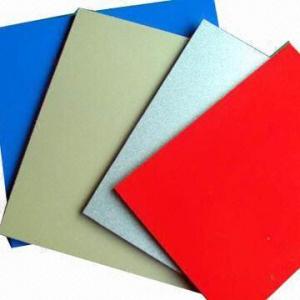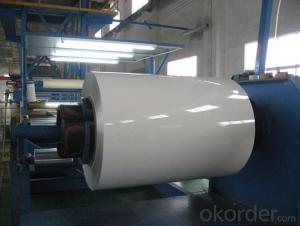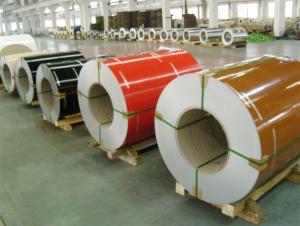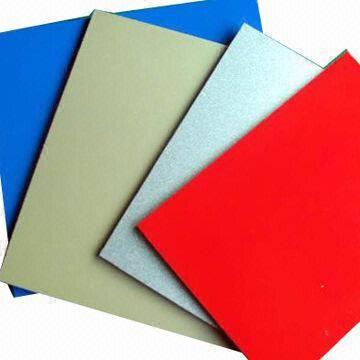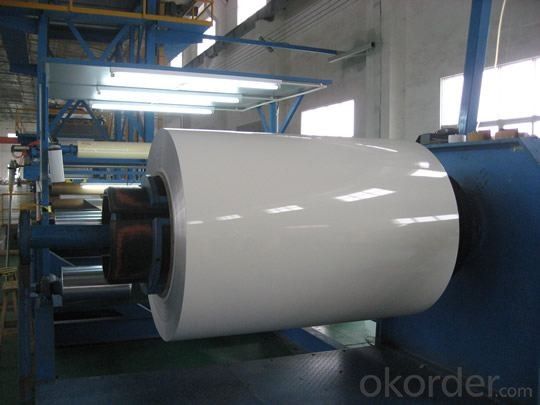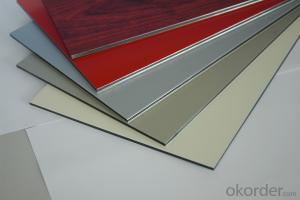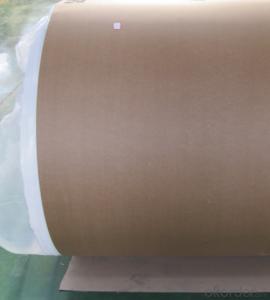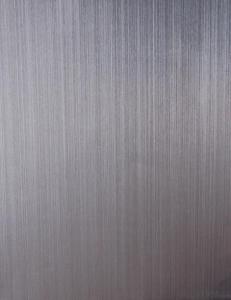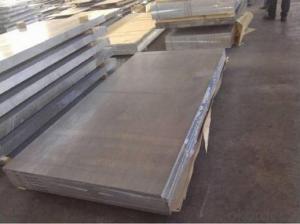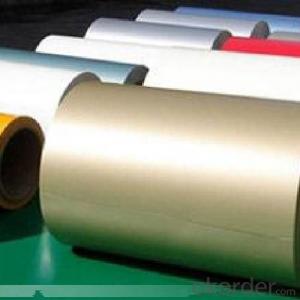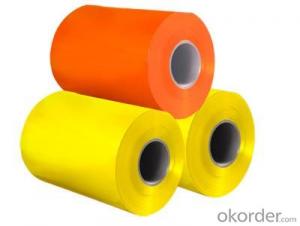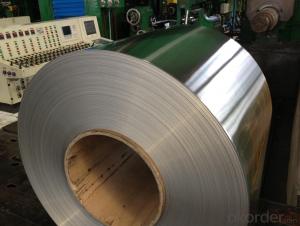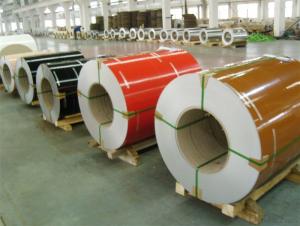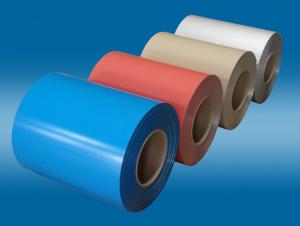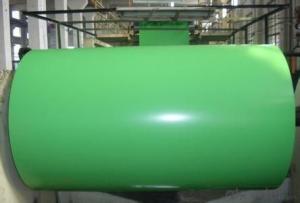Architectural Aluminum Sheets - Prepainted Aluminum Coils/Sheets - Good Price - High Quality
- Loading Port:
- Shanghai
- Payment Terms:
- TT or LC
- Min Order Qty:
- 8 m.t.
- Supply Capability:
- 1000 m.t./month
OKorder Service Pledge
OKorder Financial Service
You Might Also Like
Structure of Prepainted Aluminum Sheet/Coils Description:
Coated aluminum coil/sheet are of a wide range of colors, which gives wonderful appearance no matter in residential and commercial constructions of great exhibition centers.
The coated aluminum coil/sheet have been widely used in the fields of construction and decoration( garage doors, ceiling etc.), electronic appliances, lighting decoration, air-condition air pipes, sandwich panels and drainages etc.
Main Features of Prepainted Aluminum Sheet/Coils:
1) Perfect weather ability, high strength, no special maintenance
2) Convenient construction, short working time
3)Excellent machining heat insulation, sound insulation property and perfect fireproof performance
4) High plasticity, good impact resistance, quakeproof performance and reducing buildings load
5)Goods smoothness, lightweight and rigid, beautiful and cheap
6) Various colors available
7) Simple machining equipments, processing in spot.
Images of Prepainted Aluminum Sheet/Coils:
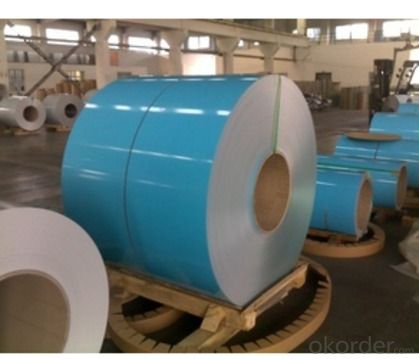
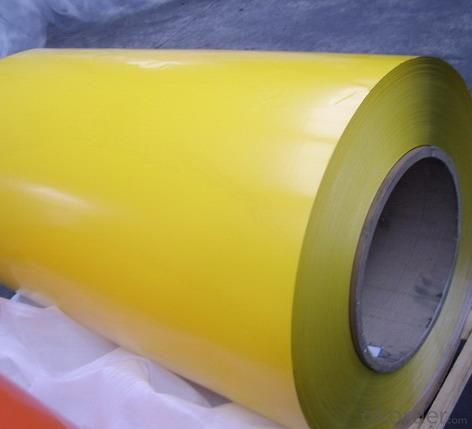
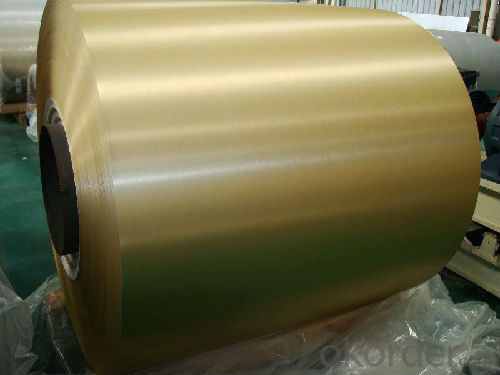
Prepainted Aluminum Sheet/Coils Specification:
NAME | PPGI | GALVANIZED | GALVALUME/ALUZINC |
CERTIFICATE | ISO9001:2008 | ||
STANDARD
| EN10142 JIS G3302 GB/T-12754-2006 | ASTM A653 JIS G3302 SGCC/SGCH GB/T2518 European Standard | ASTM A792 JIS G3321 JIS G3317
|
GRADE
| CGCC CGCH CGCD1-CGCD3 CGC340-CGC570 GRADE
| SS GRADE33-80 SGCC SGCH SGCD1-SGCD3 SGC340-SGC570 SGCC DX51D | GRADE33-80 SGLCC SGLCD SGLCDD SGLC400-SGLC570 SZACC SZACH SZAC340R |
Mode No of prepainted steel coil | 0.16MM-1.5MM*1250MM OR UNDER | (0.12-1.5)*1250MM OR UNDER | 0.16MM-1.5MM*1250MM OR UNDER |
Type of prepainted steel coil
| Steel coil Steel sheets/plates Corrugated steel sheets/plates
| Steel coil Steel sheets/plates Corrugated steel sheets/plates | Steel coil Steel sheets/plates Corrugated steel sheets/plates
|
Technique of prepainted steel coil | Hot rolled-cold rolled -galvalume /galvanized -PPGI/PPGL | Hot rolled-cold rolled - galvanized | Hot rolled-cold rolled -galvalume /Aluzinc
|
Surface treatment of prepainted steel coil | Mini/regular/big/zero spangle, Chromate treatment /chromate-free treatment /untreated unoile/oiled, TENSION LEVELLERT SKIN PASS anti-fingerprint/un-anti-fingerprint, Coating,color | Mini/regular/big/zero spangle, Chromate treatment /chromate-free treatment /untreated unoile/oiled, TENSION LEVELLERT SKIN PASS anti-fingerprint/un-anti-fingerprint, Coating
| |
Application of prepainted steel coil | Structural use ,roofing, commercial use, household appliance, industry, family | ||
SPECIAL APPLICATION | Wear resistant steel, high- strength - steel plate | ||
FAQ of Prepainted Aluminum Sheet/Coils
a.What is monthly capacity
---CNBM is one stated own company and our monthly capacity is about 1000tons.
b. Now which countries do you export your goods?
----Now we export to South East Asia,Africa, North America,South America ect.
Aluminum Coil: An Earth-Friendly Industrial Material
Whether a project calls for aluminum foil (thinner than 0.006 inches in thickness) or aluminum sheet (0.006 inches to 0.070 inches in thickness), aluminum coil is behind the manufacturing process. Aluminum coil is formed by taking one continuous strip of aluminum and coiling it into a roll.
Some of the advantages of aluminum coil is that it is lightweight, heavy duty and able to resist corrosion. By a process called anodizing, whereby the aluminum surface is coated with a protective oxide, that corrosion resistance can be improved even further. As a result, manufacturers who need to increase their productivity and require parts that can withstand the elements rely on aluminum coil to get the job done.
Why might they opt for aluminum coiling over another durable material like steel or copper? At about 33% the density and weight of steel, aluminum renders parts that are much lighter, thereby reducing handling costs and shipping fees. What's more, is the cost is about 50% that of copper.
In fact, according to the Air Conditioning, Heating, Refrigeration News, aluminum versus copper has become "The Great Condensing Coil Debate." In that article published by the industrial news source, while controversy stirs about one versus the other, one thing is clear. Condensing coils made from aluminum have made air conditioning more affordable. "That (aluminum coil) brought the cost of an a/c system down, making it more palatable to consumers and builders."
But the heating, ventilation and air conditioning sector isn't the only industry in which aluminum coil is used. The transportation industry, in fact, is the largest user of the product in the United States, accounting for close to 30% of all that is produced in the nation. Indeed, the average car driven in this country contains over 275 pounds of aluminum, and some luxury car makers use aluminum sheeting to make the entire bodies of their vehicles. Perhaps that's why aluminum has become the most abundantly produced non-iron metal.
In the construction industry, aluminum coil is also being used more and more frequently as trim to cover base materials on homes. Because the aluminum can be anodized with a decorative oxide and comes in a wide variety of colors, it provides a pleasing finishing feature. Best of all, it is easy to install, making it a nice home project for the do it yourselfer. The most typical way in which aluminum coil is put to use in homes is as a trim finish for windows, soffit boarding, siding and roof edging.
Beyond these industrial advantages, aluminum is extremely kind to the environment thanks to its ability to be recycled. That ecological friendliness is further enhanced by aluminum's ability to be recycled an infinite number of times. In the transportation industry alone, that adds up to substantial benefits to the earth. In concrete terms, the average car is made up for about 7% aluminum, yet aluminum amounts to around 40% of the total material scrap value of the average vehicle at the end of its useful life.
- Q: How does the surface roughness affect the adhesion of coatings on aluminum sheet?
- Surface roughness plays a crucial role in the adhesion of coatings on aluminum sheet. The level of roughness on the surface of the sheet directly impacts the mechanical interlocking between the coating and the substrate, which is essential for strong adhesion. When the surface of the aluminum sheet is smooth, there is limited contact area between the coating and the substrate, resulting in weak adhesion. On the other hand, a rough surface provides more contact points, increasing the interlocking between the coating and the aluminum sheet, leading to improved adhesion strength. Additionally, a rough surface promotes better wetting of the coating material on the aluminum sheet. This means that the coating material can spread more easily over the surface, filling in any gaps or crevices, and creating a more uniform and continuous coating. This improved wetting contributes to enhanced adhesion. Furthermore, a rough surface can also increase the overall surface area of the aluminum sheet. A larger surface area means that there is more available space for the coating material to adhere to, increasing the adhesion strength. It is important to note that there is an optimum level of roughness for achieving the best adhesion. If the surface is excessively rough, it may lead to incomplete coverage of the coating material or the formation of voids, reducing adhesion. Therefore, finding the right balance of roughness is crucial to ensure optimal adhesion of coatings on aluminum sheet.
- Q: What is the price range of aluminum sheets?
- The cost of aluminum sheets can fluctuate due to multiple elements, including the sheet's dimensions, thickness, and quality, as well as the supplier and market circumstances. Typically, the price of aluminum sheets can vary between approximately $0.50 and $5 per square foot. Thinner sheets or lower-quality aluminum tend to occupy the lower end of this price spectrum, while thicker sheets or higher-quality aluminum tend to fall on the higher end. It is advisable to compare prices among various suppliers to secure the most advantageous offer.
- Q: How much should I be charged to have aluminum siding installed? I have a two floor single family home which is detached. I also would want new gutters installed and soffets (i think that is what they are called). One company estimated 12k and another said 10K. This would entail just putting the siding over the original siding. Any answers are appreciated.
- You have no say in the matter. The insurance company is paying the contractor to remove and dispose of the old siding. They don't care if the contractor makes a few hundred bucks selling the siding as scrap and neither should you.
- Q: What is the standard thickness of aluminum sheets used for exterior building applications?
- <p>The typical thickness of aluminum sheets used for building exteriors ranges from 0.7mm to 1.2mm. This range is suitable for applications such as facades, cladding, and roofing. The specific thickness can vary depending on the structural requirements, wind loads, and the overall design of the building. Thicker sheets may be used for more robust structures or in areas with higher wind pressures, while thinner sheets can be used for lighter applications or when a more aesthetically pleasing finish is desired.</p>
- Q: Can aluminum sheets be used for air ducts?
- Yes, aluminum sheets can be used for air ducts. Aluminum is a commonly used material for air ducts due to its lightweight and durable properties. It is resistant to corrosion, which makes it a suitable choice for HVAC systems. Aluminum sheets are often used to fabricate air ducts as they can be easily bent and shaped to fit the required dimensions. Additionally, aluminum has good thermal conductivity, allowing for efficient heat transfer within the ducts. Overall, using aluminum sheets for air ducts is a practical and effective choice.
- Q: This question asks for a comparison between aluminum sheets and other lightweight materials like plastic and glass, focusing on their properties and uses.
- <p>Aluminum sheets are lightweight yet strong, offering excellent strength-to-weight ratios. They are more durable and heat resistant compared to plastics, which can deform under heat and are less sturdy. Unlike glass, aluminum is less brittle and does not shatter, making it safer for certain applications. Additionally, aluminum is recyclable and has good thermal and electrical conductivity, which is not the case with plastics. However, plastics are generally cheaper and easier to shape into complex forms, while glass offers better transparency for applications requiring clear visibility. Each material has its advantages depending on the specific requirements of the application.</p>
- Q: Characteristics of anodized aluminium plate
- (1) good processing: anodized aluminum decorative strong, moderate hardness, easy bending forming, continuous high-speed, convenient and direct processing into products, no need for complicated surface treatment, greatly shorten the production cycle and reduce production cost.(2) good weather resistance: standard thickness of oxide film (3 m) anodized aluminum plate, indoor use for a long time, no discoloration, no corrosion, no oxidation, no rust. Anodized aluminum oxide film (10 m) can be used outdoors, and can be exposed to sunlight for a long time without discoloration.
- Q: Can aluminum sheets be anodized?
- Yes, aluminum sheets can be anodized. Anodizing is an electrochemical process that creates a durable, corrosion-resistant layer on the surface of aluminum. This process can be applied to aluminum sheets to enhance their appearance, increase their resistance to wear and tear, and improve their overall performance.
- Q: How do aluminum sheets perform in terms of thermal expansion and contraction?
- Aluminum sheets have a relatively high coefficient of thermal expansion, meaning they expand and contract more than most other materials when exposed to heat or cold. The coefficient of thermal expansion for aluminum is approximately 23 x 10^-6 per degree Celsius. This means that for every degree Celsius increase in temperature, aluminum will expand by 23 millionths of its size. This thermal expansion and contraction property of aluminum makes it suitable for various applications where temperature fluctuations are expected. For instance, in the construction industry, aluminum sheets are commonly used for roofing and cladding purposes. These sheets can withstand the thermal stresses caused by the changing temperatures without warping or distorting significantly. Moreover, this characteristic of aluminum also makes it ideal for manufacturing products like cookware and heat sinks. Aluminum cookware heats up quickly and evenly due to its high thermal conductivity and expands uniformly, preventing warping or deformation when exposed to heat. Similarly, aluminum heat sinks effectively dissipate heat generated by electronic components, as they can accommodate thermal expansion without compromising their structural integrity. However, it is important to note that while aluminum sheets have good thermal expansion and contraction properties, extreme temperature changes can still lead to some dimensional changes. Therefore, proper consideration of the anticipated temperature variations is crucial when designing and using aluminum sheets to ensure their optimal performance and longevity.
- Q: Are the aluminum sheets suitable for manufacturing audio speaker enclosures?
- Yes, aluminum sheets are suitable for manufacturing audio speaker enclosures. Aluminum is a lightweight and durable material that is commonly used in the production of speaker enclosures. It has excellent acoustic properties, allowing for clear and accurate sound reproduction. Additionally, aluminum is resistant to corrosion, which ensures the longevity of the speaker enclosure. Furthermore, aluminum can be easily molded and shaped into various designs, allowing for flexibility in the manufacturing process. Overall, aluminum sheets are a suitable choice for manufacturing audio speaker enclosures due to their acoustic properties, durability, and versatility.
Send your message to us
Architectural Aluminum Sheets - Prepainted Aluminum Coils/Sheets - Good Price - High Quality
- Loading Port:
- Shanghai
- Payment Terms:
- TT or LC
- Min Order Qty:
- 8 m.t.
- Supply Capability:
- 1000 m.t./month
OKorder Service Pledge
OKorder Financial Service
Similar products
Hot products
Hot Searches
Related keywords
